How to get cheaper or more accurate RTK guidance
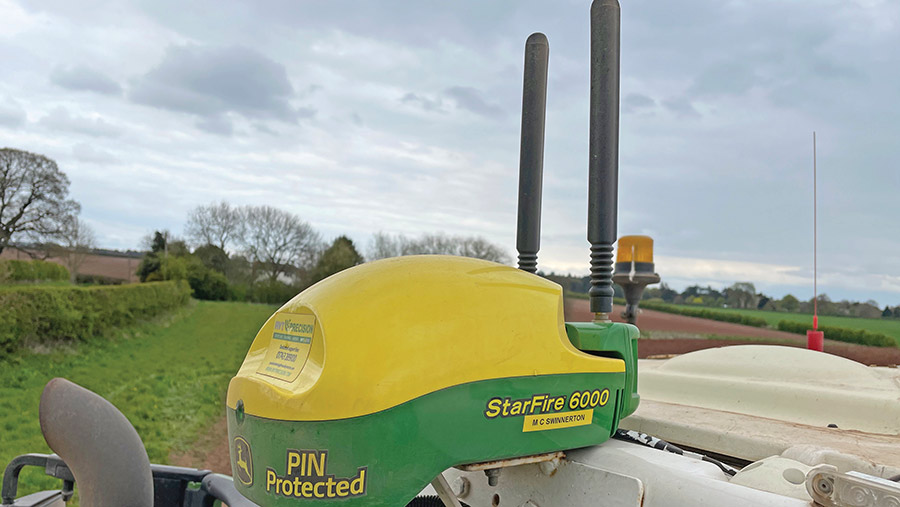 © James Andrews
© James Andrews There is something to be said for keeping the old skills alive, but when it comes to driving in straight lines, few people want to go back once they’ve had a computer do the job for them.
Consequently, guidance systems are becoming an integral part of modern farming, with those operators who need to tackle the most precise tasks paying subscription fees to access top-level real-time kinematic (RTK) correction signals.
It might sound fancy, but this high-end technology guides machinery using the same free-to-access GPS satellites as mobile phones and cheap-and-cheerful lightbars.
See also: Farmers build ultra-accurate GPS system on a budget
Where it differs is that it also requires a signal from a fixed ground-based reference point, which corrects the inaccuracies caused by satellites drifting.
The result is sub-2cm pass-to-pass accuracy that’s repeatable, meaning tramlines or beds can be placed in exactly the same place year after year.
This is where the cost comes in, as these reference points are usually privately owned base stations placed on buildings or masts, which send out encoded signals that can be picked up by RTK-enabled receivers.
These tend to belong either to individuals or small groups of farmers, machinery dealers or specialist networks.
But regardless of who owns them, there’s typically a subscription fee to access the signal, which ranges from about £450 to £800 a year.
Many farmers and contractors will go for the safe option of getting their RTK signal from the dealer that provided their GPS kit.
However, many modern receivers are compatible with scores of other networks, thanks to the universal Ntrip system.
Cheaper and free correction signals
This makes it relatively easy to shop around for either a better or lower-cost option or, for those lucky enough to be within range, connect to a base station that the owner has made available free.
These are typically shared through a website called RTK2Go, which has a map of free Ntrip base stations and provides details of how to connect to them – more on this later.
Note that if you do go down this route you may be at greater risk of signal dropout and you’ll find fixing problems isn’t as simple as just picking up the phone.
So if you are less tech savvy or can’t afford any drops in connection, it’s probably sensible to stick with a trusted supplier that offers support.
Types of correction signal
For those who could do with a refresher on the various methods of beaming RTK to your machine, here they are in a nutshell:
Radio RTK
When RTK first came to the fore, most base stations were configured to emit radio signals that could be picked up by a tractor’s receiver.
They are relatively simple pieces of technology and work over a limited range of 12 miles or so, meaning larger or particularly hilly farms may have to install more than one base station or repeaters to cover the area.
For those trying to setup a large network, significant numbers of base stations are required and it takes considerable time for them to build up their area of coverage.
Networks of radio base stations still exist and there are plenty of units on individual farms, but it is no longer the primary method for subscription services.
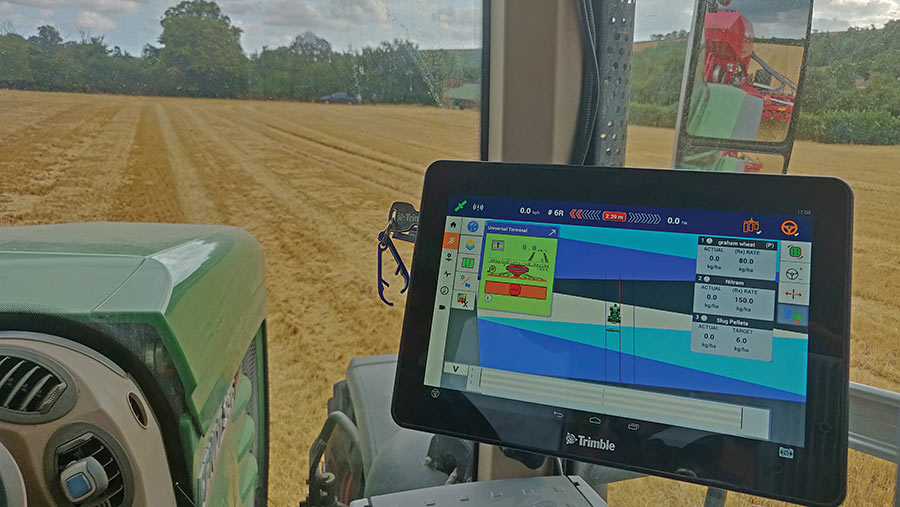
© James Andrews
Ntrip
Ntrip has gradually taken over from radio systems as correction signals are sent via mobile internet, allowing one base station to cover a larger area of about 30 miles.
Big networks can achieve a broader spread than this by using a system called VRS.
This makes use of complex algorithms and triangulation from distant base stations to create a virtual reference point near the user, which regularly updates.
The signal isn’t brand-specific either, so almost any type of receiver can connect to any base station, meaning customers can chop and change as they see fit.
The downsides of the Ntrip approach are that a mobile data SIM card is required which adds some cost, although this is usually rolled into the subscription price.
There is also the risk of the connection dropping out for those in poor signal areas.
Some brands get around this by switching users onto their highest-accuracy satellite guidance service until the mobile connection resumes, while others supply longer antennas or carry out a survey to find the best possible network.
The good news is that Ntrip can deal with a fairly poor mobile signal, so even those who struggle to make phone calls in their area won’t necessarily need to rule it out.
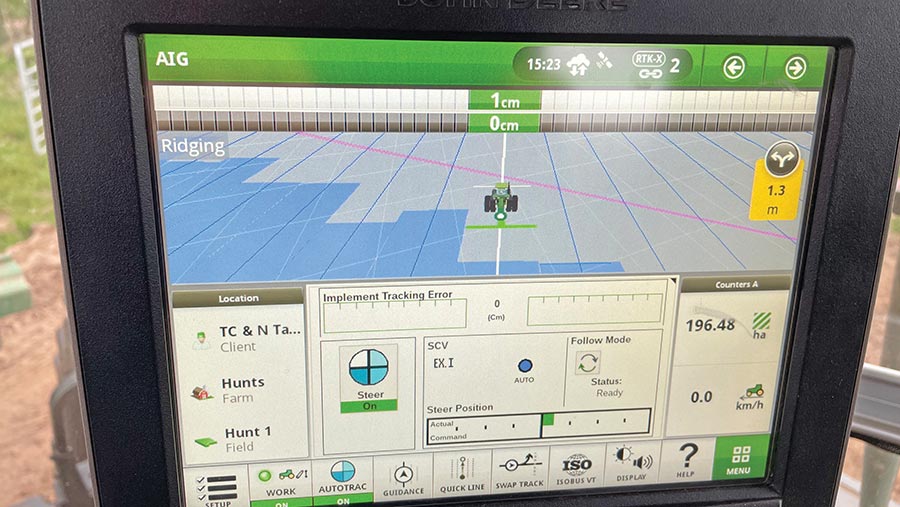
© James Andrews
Personal base stations
To be completely independent, the answer is to install your own base station.
These can be expensive (£10,000 or more) if sourced from mainstream brands, but there are some lower-cost alternatives from firms such as Fieldbee, FJ Dynamics and CHC Nav.
Those with a bit of technical nouse also have the option of putting their own base station together using components from firms such as Ardusimple.
Advice is available from other likeminded individuals on forums such as AgOpenGPS, but it’s best avoided until you’re up to speed with this sort of technology.
Accurate satellite signals
It might not be RTK, but several brands offer high-accuracy satellite correction signals that give similar performance for arable work.
Examples include John Deere’s SF3 and Trimble’s Centerpoint RTX, which claim pass-to-pass accuracy of 3cm and 2.5cm, respectively.
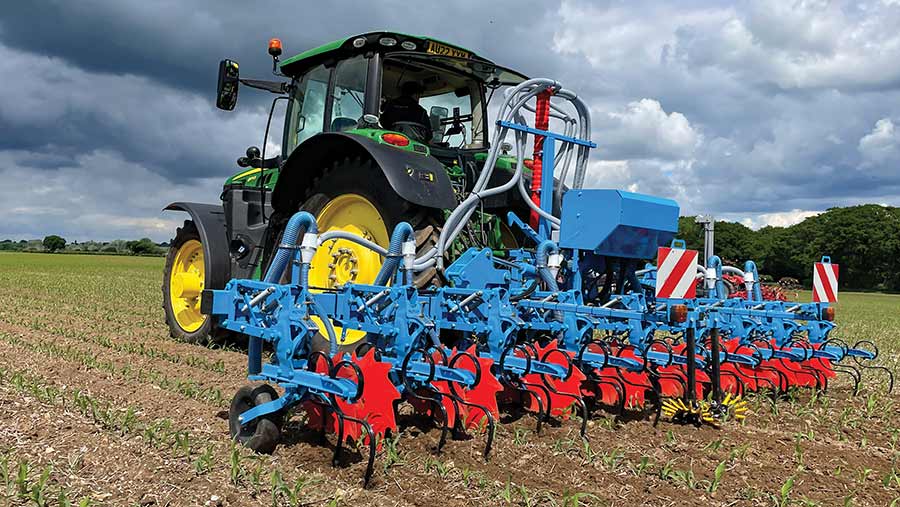
© James Andrews
A key benefit is that they give nationwide coverage without the need for a SIM card, but they can be just as, if not more, expensive than RTK, and they’re usually only compatible with the supplier’s own equipment, which removes the opportunity to shop around.
RTK correction signal providers
AS Communications – GPS dealer network
Ntrip VRS £750 a year including data roaming SIM card
Trimble radio network £600 a year. Coverage in eastern counties, Shropshire, Somerset and Kent
Private Trimble radio base station £12,000 upfront and free thereafter
Trimble Centerpoint RTX satellite-corrected signal £650 a year
Trimble reseller AS Communications offers several correction signal options to suit different users.
These include a Trimble-only radio RTK network which has coverage in the eastern counties, parts of Shropshire, Somerset and Kent, the option of installing a private base station (this is becoming less popular) or access to Trimble’s Ntrip VRS network.
According to the firm, radio continues to be the most popular option for customers within range of the network, while some outside this opt for the Ntrip service. Prices for these are £600 and £750 a year, respectively.
However, the most popular non-radio service is Trimble’s high-accuracy satellite signal, Centerpoint RTX.
This is almost as precise as RTK, doesn’t require a mobile SIM card and costs slightly less at £650 a year. It is only compatible with Trimble receivers.
Dempsey Precision Ag Signal RTK – GPS dealer network
Ntrip £450 including SIM card (national coverage)
North Yorkshire outfit Dempsey Precision offers a nationwide Ntrip RTK correction service that allows users to connect to an individual base station, with no VRS option.
All areas of England, Scotland and Wales that have reasonable mobile phone signal can connect to the service and it is compatible with all brands of receiver.
There is a fixed subscription fee of £450 a year, which includes a mobile SIM card.
Ben Burgess – Machinery dealer network
Ntrip £650 a year plus cost of a data SIM card
Ben Burgess introduced its Ntrip RTK network in 2012 and now has base stations installed at all of its dealerships.
Several other dealers such as P Tuckwell, Netherton Tractors and Tallis Amos Group have joined the network and increased the coverage. However, they sell access to it independently.
Most brands of receiver can connect to the base stations, providing there is a strong enough mobile signal.
Those with a John Deere StarFire receiver unlocked for RTK get the benefit of a service called RTK Extend, which automatically switches to Deere’s high-accuracy 3cm SF3 satellite signal if mobile signal is lost.
It offeres two weeks of free coverage, after which the system switches to SF1 with 15cm pass-to-pass-accuracy.
Annual subscription is £650, with an additional charge for a suitable mobile data SIM card.
RTKF Net – Independent network
Ntrip VRS £650 annual fee including SIM card (national coverage)
Trimble radio network £525 (eastern counties, Oxfordshire, Kent)
Founded by four East Anglian farmers, RTKF Net (formerly RTK Farming) began by offering a radio-based correction signal for Trimble receivers covering the eastern counties, parts of Oxfordshire and Kent.
In 2018 it significantly expanded operations, adding an Ntrip service that offers nationwide coverage.
Users can either connect direct to their nearest base station or use the VRS service that creates a virtual base station near their location.
All infrastructure is owned, operated and maintained by the company, which it says allows it to quickly diagnose and fix any problems.
A standard subscription to the Ntrip service costs £650, including a data roaming SIM card that seeks out the best quality signal.
For those in patchy reception areas, the support team have several methods for boosting performance, such as providing taller aerials or single-network SIM cards that latch permanently to the strongest signal.
Those interested in the service can either buy direct through RTKF Net or through one of the dealers it has partnership agreements with.
Annual subscription fees to the original radio-based Trimble system are lower at £525, as no SIM card is required.
RTK2Go – Free correction signal
Ntrip No-fee correction signals, but mobile data SIM card is required.
Visitors to the RTK2Go website will find a map of free-to-access Ntrip base stations available in their area and some instructions on how to connect to them.
The site is built for the technically minded, so a degree of homework will be required for the complete amateur to work out what they’re doing.
As it’s a DIY service, users will also need to buy their own mobile data SIM card – contracts for these can be found from as little as £5 per month – which slots into the receiver.
Free base stations listed on the site include two units in County Tyrone and County Londonderry belonging to dairy farmer and electronics whizz Andrew Wright.
He builds his own GPS systems, which he sells to other farmers, and he is in the process of setting up an Ntrip RTK network in Northern Ireland that will be loaded onto the RTK2Go service and will be free for anyone to access.
An alternative community-owned Ntrip service has been set up recently by Swiss organisation Onocoy, which currently has 2,000 base stations registered globally.
Free RTK correction signal delivers for County Londonderry dairy and arable farmer
Alistair Craig, Carsehall, Limavady, Londonderry
Keen to tap into the benefits of precise RTK guidance but unable to justify the cost of a top-end system, dairy and arable farmer Alistair Craig went in search of a cheaper alternative.
After weighing up the options, he settled on a complete kit from Chinese firm FJ Dynamics, including a motorised steering wheel, receiver and screen, which set him back £3,000 in 2019.
As he was one of the first to buy one in Northern Ireland, this was about £1,000 lower than the going rate.
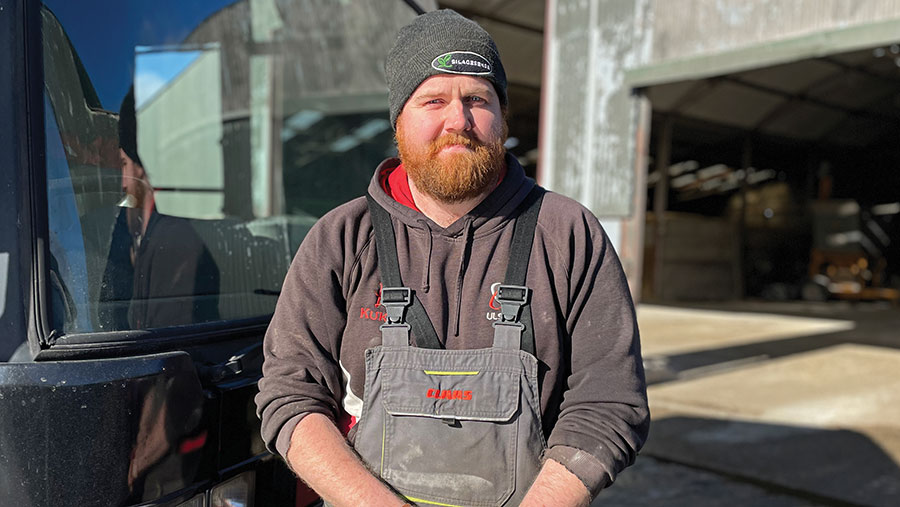
Alistair Craig © James Andrews
“I’d priced up options from mainstream brands such as Trimble and they were coming in at about £15,000, which I just couldn’t justify,” he says.
“The FJ Dynamics setup was just so much cheaper I thought it was worth a try.”
Getting the hardware set up was simple enough and took about three hours, but with few RTK correction signals available in Northern Ireland at the time, Alistair paid an extra £1,000 to have his own radio base station.
FJ Dynamics claimed this would cover distances of up to 12km which, in theory, would allow him to work in his most remote fields.
However, in practice it delivered consistent results to only about half that distance.
The base station was therefore mothballed and he turned to Andrew Wright of Farm Theory who, for a small fee, installed an Ntrip base station on the farm and connected it to the free signal-sharing service RTK2Go.
Alistair then slotted a standard mobile data SIM card (about £8 a month) into his FJ Dynamics screen which allows him to use the RTK system anywhere on the farm without paying an ongoing fee.
In fact, anyone in the area can connect to this base station free, as well as to the other Farm Theory base station located on Andrew’s farm in County Tyrone.
Alistair says: “There are a few dealer-operated RTK networks in Northern Ireland now, but the last time I checked these were about £800, so Andrew’s free network is a substantial saving.
“I know of a couple of other people that are using it successfully, including a friend who has bought a Fieldbee autosteer system.”
For three years the FJ Dynamics kit was used for all the farm’s cereal drilling and it delivered consistent results. However, when he did have problems, the support was a little inconsistent.
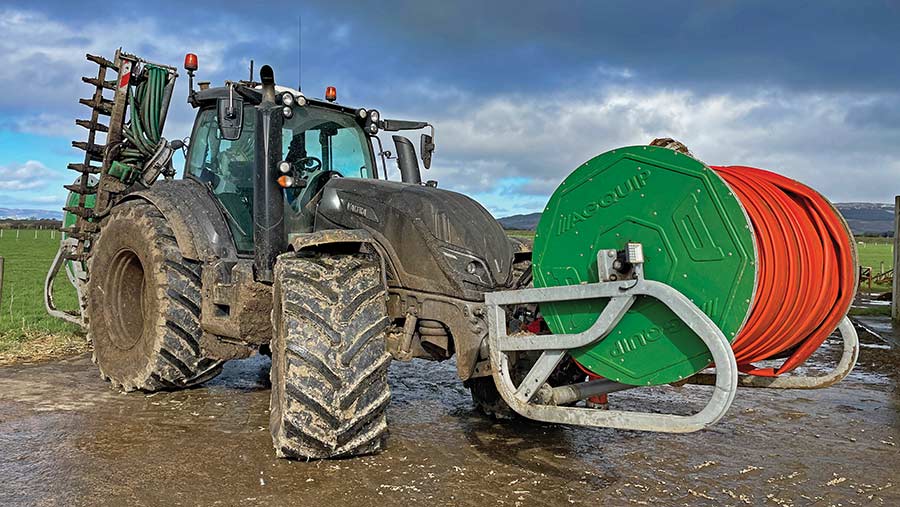
Alistair Craig’s new Valtra is RTK-ready © James Andrews
The recent arrival on the farm of a 2018 Valtra T214 Versu, which is autosteer ready and unlocked for RTK, meant the old kit was no longer needed so he sold it on.
In theory, the Valtra should be able to connect straight to the RTK2Go signal, but its Trimble-based system requires an additional piece of code to make it compatible.
Alistair says: “That’s beyond me, so I’m relying on Andrew to sort it all out.”

